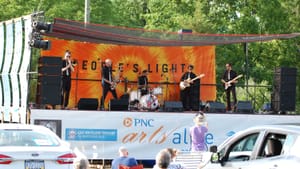Stay in the Loop
BSR publishes on a weekly schedule, with an email newsletter every Wednesday and Thursday morning. There’s no paywall, and subscribing is always free.
When can you start?
Like it or not, you have a new job in the pandemic

“I hope you’re doing great!!” the email started—but I quickly realized this was a disingenuous greeting. Anyone who’s invested in my wellbeing would not invite me to a live indoor opera performance this month. But that’s just what this person proceeded to do. And I realized that I have a responsibility I never could have imagined.
“I wanted to alert you to the fact that, while major performing arts institutions are still closed due to the ongoing pandemic, [opera company] is BACK ON!!!” the early July message said, announcing that the company had “boldly reopened its doors last month” with one production, and was presenting another in mid-July.
Excuse me?
The new job description
In my mind, arts journalists at outlets like BSR have three core responsibilities. First, our recommendations and reviews are an independent, expert guide for cultural consumers on where to spend their money, attention, and time. Second, the commentary and critiques of arts journalists can play an important role in shaping the future of the work itself—questions of legacy and history, quality, accuracy, access, and inclusion (to name just a few things) are part of the conversation arts journalists should promote. Third, arts journalism is a record. Every feature, profile, or review ensures that cultural happenings—which often capture moments of political and social revolution—are documented for the future in an invaluable repository of our creativity, our stories, our values, and our transformations.
But in 2020, arts journalists add a fourth responsibility we never bargained for: protecting the public from a rampant deadly disease.
A tale of two operas
As an editor, I never thought that I would have to weigh coverage options based on public safety. For example, BSR won’t promote details about an indoor opera performance in summer 2020. I’m no medical expert, but I do know that if infected people are singing, there is a high risk they will project virus particles along with their voices. I’m no doctor, but I’m convinced that even if the hosts encourage social distancing, hand sanitizer, and masks, it is not safe to spend an afternoon in an enclosed space with a crowd of strangers listening to singers.
These are the considerations that led BSR to cover a different opera performance this summer, which featured solo singers outside at a distance from the audience, who sat in well-spaced parked cars and read the show notes on their smartphones.
Our last chance?
Many people can relate to the decisions I’m now making as an arts journalist and editor. From dining and retail to worship and entertainment, industry leaders have a whole new calculus to perform, among the cascading failures of America’s political, economic, educational, and public-health infrastructures.
We continue to suffer confusion over the most critical and fundamental questions. Where can I get tested? Can I afford it? When will I know the results? How long am I contagious? Can I avoid catching and spreading this sickness without destroying every other part of my life?
Suddenly, individual people with half an eye on good reporting and half a care for the human race realize that among the constant spool of public calamity, we have what might be our last chance to overcome this, short of a speedy vaccine: modeling and promoting interpersonal behaviors that slow the spread of COVID-19.
So we beg our families, friends, neighbors, and followers to wear a mask, avoid indoor crowds, keep six feet away from others, and wash their hands—knowing that if we don’t all do this, more people will die.
We need to acknowledge what a crushing new responsibility that is.
Holding up our end
People in communities across the United States are fighting a pandemic with masks and video meetings while many of our top officials lie, blunder, and enrich their own power, instead of enacting solutions to the loss of our income, our healthcare, our housing, and our loved ones.
It’s as if our government refuses to fix a crumbling public bridge, so a crowd of frightened individuals rush to hold it up by hand in a desperate effort to save those trapped above. With their fingers jammed against the iron rods and cracking concrete, the people try to pretend this is a normal responsibility—and that they can still go about their day while performing it.
My deciding which opera performance will be safe and which one could land you in the hospital is not a normal responsibility, either. How will arts journalists begin to evaluate not only the aesthetic and cultural merits of the event, but its safety?
We’re about to find out.
Sign up for our newsletter
All of the week's new articles, all in one place. Sign up for the free weekly BSR newsletters, and don't miss a conversation.

 Alaina Johns
Alaina Johns